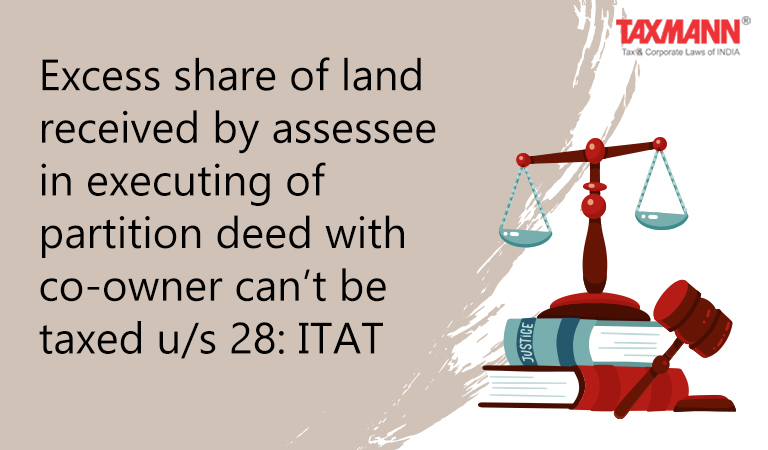Excess share of land received by assessee in executing of partition deed with co-owner can’t be taxed u/s 28: ITAT
- Blog|News|Income Tax|
- 2 Min Read
- By Taxmann
- |
- Last Updated on 28 October, 2021

Case details: ITO v. Undavalli Constructions - [2021] 131 taxmann.com 204 (Visakhapatnam - Trib.)
Judiciary and Counsel Details
-
- N.K. Choudhry, Judicial Member and D.S. Sunder Singh, Accountant Member
- D.K. Sonowal, CIT (DR) for the Appellant.
- G.V.N. Hari, AR for the Respondent.
Facts of the Case
The assessee was a partnership firm engaged in the business of construction. It, along with another firm, had purchased land with equal contribution of investment. The land was retained for 34 months, and then the assessee and co-owner entered into a partition deed. In partition, the assessee got excess land than the co-owner.
The Assessing Officer (AO) believed that the excess land received by the assessee was the extra benefit received, and the same was chargeable under section 28(iv). However, on appeal, the CIT(A) reversed the order of AO. Aggrieved-AO filed the instant appeal before the Tribunal.
ITAT Held
The Tribunal held that land was purchased as a capital asset by the assessee and co-owner and remained a capital asset until the partition. The asset was shown in the balance sheet as a capital asset and not stock-in-trade. Further, there was no business activity carried on by the co-owners.
The said land was converted into stock-in-trade by the assessee after the partition, and this fact was established by the assessee as per the sanction order for conversion of land, which was obtained from the Commissioner, Municipal Corporation.
After taking the land on the partition, the assessee sold the property after the development and declared the average sale value of certain amount, which was more than the value adopted by the AO. Thus, there was no loss of revenue for dept.
Accordingly, the excess area of land received by the assessee by entering into the partition deed was not taxable under section 28(iv).
Case Review
-
- CIT v. Excel Industries Ltd. [2013] 38 taxmann.com 100/219 Taxman 379/358 ITR 295 (SC) (para 6.4)
- CIT v. Bharat Kumar R. Panchal [2002] 125 Taxman 183/[2001] 252 ITR 454 (Guj.) (para 6.2) followed.
List of Cases Referred to
-
- CIT v. Triveni Engg. & Industries Ltd. [2010] 8 taxmann.com 146/[2011] 196 Taxman 94/336 ITR 374 (Delhi) (para 3.2)
- CIT v. Excel Industries Ltd. [2013] 38 taxmann.com 100/219 Taxman 379/358 ITR 295 (SC) (para 3.2)
- CIT v. Aditya Builders [2017] 79 taxmann.com 394/[2015] 378 ITR 75 (Bom.) (para 3.2)
- P. Krishna Menon v. CIT [1959] 35 ITR 48 (SC) (para 3.2)
- CIT v. Bharatkumar R. Panchal [2002] 125 Taxman 183/[2001] 252 ITR 454 (Guj.) (para 5)
- ITO v. Shreyans Investments (P.) Ltd. [2013] 31 taxmann.com 11/141 ITO 672 (Kol.) (para 6.2).
Disclaimer: The content/information published on the website is only for general information of the user and shall not be construed as legal advice. While the Taxmann has exercised reasonable efforts to ensure the veracity of information/content published, Taxmann shall be under no liability in any manner whatsoever for incorrect information, if any.

Taxmann Publications has a dedicated in-house Research & Editorial Team. This team consists of a team of Chartered Accountants, Company Secretaries, and Lawyers. This team works under the guidance and supervision of editor-in-chief Mr Rakesh Bhargava.
The Research and Editorial Team is responsible for developing reliable and accurate content for the readers. The team follows the six-sigma approach to achieve the benchmark of zero error in its publications and research platforms. The team ensures that the following publication guidelines are thoroughly followed while developing the content:
- The statutory material is obtained only from the authorized and reliable sources
- All the latest developments in the judicial and legislative fields are covered
- Prepare the analytical write-ups on current, controversial, and important issues to help the readers to understand the concept and its implications
- Every content published by Taxmann is complete, accurate and lucid
- All evidence-based statements are supported with proper reference to Section, Circular No., Notification No. or citations
- The golden rules of grammar, style and consistency are thoroughly followed
- Font and size that’s easy to read and remain consistent across all imprint and digital publications are applied



 CA | CS | CMA
CA | CS | CMA
